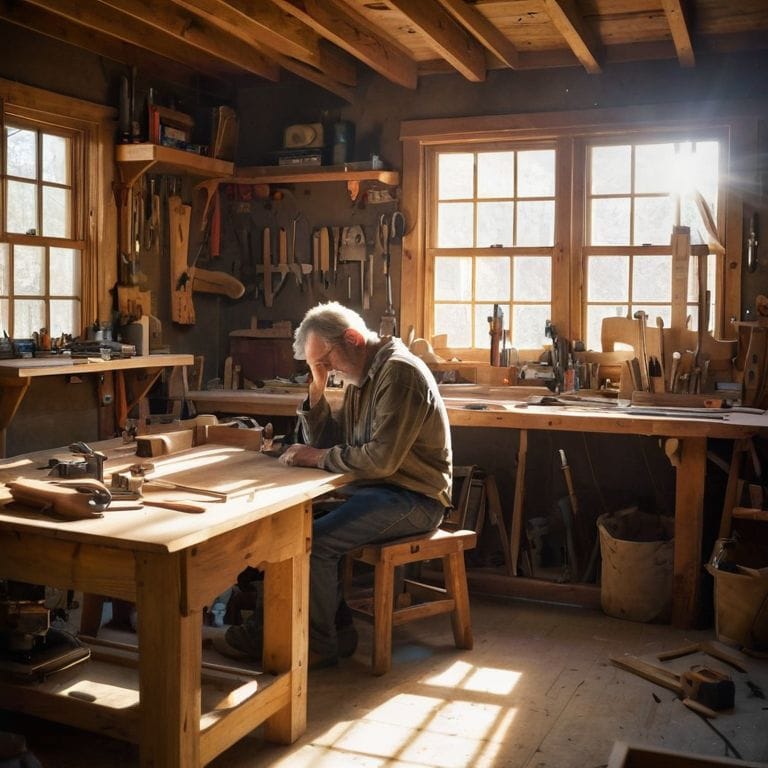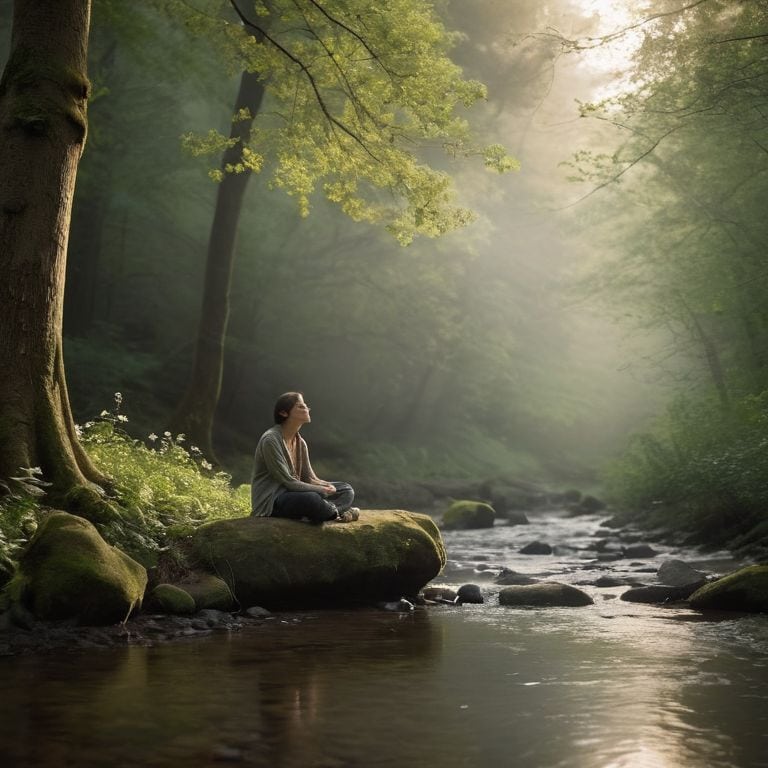I still remember the smell of damp earth and gasoline from my old motorcycle, which I’d restore in the solitude of my garage. It was there, surrounded by the grit and decay of broken machines, that I discovered the benefits of solitude. Not as some fancy, Instagrammable concept, but as a raw, unbridled force that can strip away the facade and leave you face to face with your true self. The world often tells us that solitude is a luxury, a chance to “recharge” and “find oneself” in some clichéd, superficial way. But I’ve found that the real power of solitude lies not in its ability to make us feel good, but in its capacity to make us feel alive, to confront the parts of ourselves we’ve been trying to keep hidden.
As someone who’s spent years documenting the beauty in brokenness, I’ve come to realize that the benefits of solitude are not about escapism, but about embrace. It’s about embracing the cracks, the imperfections, and the uncertainties that make us human. In this article, I promise to share with you my own experiences, unvarnished and unapologetic, about how solitude has shaped me into the person I am today. I’ll show you how the benefits of solitude can be a catalyst for growth, a chance to develop a deeper understanding of yourself and the world around you. No fluff, no clichés, just the hard-earned truth from someone who’s been in the trenches and has the scars to prove it.
Table of Contents
Finding Strength in Solitude

As I sit here, surrounded by the quiet of my workshop, I’m reminded of the importance of alone time. It’s in these moments that I can reflect on my experiences, and find inspiration in the stillness. I’ve always been drawn to the stories of others who have found strength in solitude, whether it’s a long-distance trekker or a photographer who ventures into the wilderness to capture the beauty of the unknown.
For me, solitude is a chance to recharge and refocus, to let my mind wander and explore the depths of my own thoughts and emotions. It’s in these quiet moments that I’ve found increasing productivity, as if the silence has a way of clarifying my priorities and helping me to stay focused on what truly matters. Whether I’m working on a new photography project or restoring an old motorcycle, I’ve learned to appreciate the value of quiet environments in helping me to stay motivated and inspired.
In solitude, I’ve discovered a sense of mental clarity that I rarely find in the chaos of everyday life. It’s as if the stillness has a way of washing away the distractions, leaving me with a sense of emerging self-awareness that is both exhilarating and terrifying. It’s a reminder that true growth often requires us to confront our own limitations and imperfections, and to find a way to embrace them as a part of our journey.
Embracing Alone Time for Mindfulness
As I reflect on my own experiences with solitude, I’ve come to realize that embracing alone time can be a powerful tool for mindfulness. It’s in these quiet moments that we can tune into our thoughts, emotions, and surroundings without distraction.
I’ve found that being still can be incredibly liberating, allowing us to reconnect with our inner selves and the world around us.
How Quiet Environments Boost Productivity
As I sit in my dimly lit workshop, surrounded by the worn parts of old motorcycles, I find that the stillness of the environment allows me to focus on the intricate details of my craft. The quiet hum of the tools and the occasional creak of the wooden workbench are the only sounds that break the silence, creating an atmosphere that fosters concentration.
In this peaceful setting, I’ve discovered that mental clarity is just a few moments of solitude away. With each passing minute, my mind becomes sharper, and I’m able to tackle complex problems with renewed energy and creativity, leading to a significant boost in productivity.
The Benefits of Solitude Uncovered

As I reflect on my own experiences with solitude, I’ve come to realize the importance of alone time in fostering personal growth. It’s in these quiet moments that we can truly tune into our thoughts and emotions, allowing us to reconnect with our inner selves. By doing so, we can gain a deeper understanding of our values and motivations, and make more intentional decisions about the direction of our lives.
In my work as a documentary photographer, I’ve often found that solitude is essential for increasing productivity in quiet environments. Without the distractions of everyday life, I can fully immerse myself in my craft, and tap into a sense of creativity and focus that might otherwise elude me. This, in turn, has allowed me to produce work that is more authentic and meaningful, and to find inspiration in isolation.
Through my experiences, I’ve also come to understand how solitude affects mental health. By embracing alone time, we can begin to heal from the wounds of our past, and develop a greater sense of self-awareness and compassion. This, I believe, is a crucial step towards cultivating emotional resilience, and living a more wholehearted, authentic life.
Introversion as Self Care and Inspiration
As I reflect on my own journey, I’ve come to realize that embracing my introversion has been a crucial aspect of my self-care. It’s allowed me to recharge and refocus, often leading to new insights and inspiration for my photography and storytelling. In the stillness, I’ve found a sense of clarity that eludes me in louder, more chaotic environments.
For me, quiet contemplation is a powerful catalyst for creativity and personal growth. It’s in these moments of solitude that I’m able to tap into my inner world, exploring the depths of my own thoughts and emotions. This introspective process has been instrumental in shaping my narrative voice, allowing me to craft stories that are authentic and meaningful.
Mental Health Benefits of Isolation Explained
As I reflect on my own experiences with solitude, I’ve come to realize that it’s been a crucial factor in my mental health journey. The quiet, the stillness, it’s allowed me to confront parts of myself that I’d been trying to keep hidden.
In the darkness of solitude, I’ve found a strange sort of liberation. It’s as if the absence of external noise has given me permission to listen to my own thoughts, to explore the depths of my own mind, and to emerge stronger, wiser, and more at peace.
Unearthing the Beauty of Alone: 5 Key Tips to Harness the Power of Solitude
- I’ve learned to schedule solitude into my daily routine, just as I would any other important appointment, because I’ve found that it’s in these quiet moments that I’m able to reconnect with my own thoughts and feelings
- Embracing solitude doesn’t mean you have to become a hermit – it can be as simple as taking a few minutes each day to sit in silence, breathe deeply, and let go of the distractions that clutter our minds
- Getting lost in nature has been a powerful solitude practice for me, allowing me to clear my mind and tap into a sense of awe and wonder that’s hard to find in our increasingly urban lives
- I’ve come to realize that solitude isn’t just about being alone – it’s about being present, fully and completely, in the current moment, without the influence of others to shape our thoughts or emotions
- By embracing solitude, we can begin to uncover our own unique voice, our own perspective, and our own sense of purpose, rather than simply following the crowd or trying to fit into someone else’s mold
Key Takeaways from the Power of Solitude
I’ve learned that solitude isn’t just a state of being alone, but a catalyst for confronting our deepest fears, desires, and motivations – a chance to rediscover ourselves in the quiet
By embracing solitude, we can tap into a deeper sense of mindfulness, boost our productivity, and uncover the hidden benefits of introversion as a means of self-care and inspiration
Ultimately, it’s in the stillness, the cracks, and the imperfections that we find true strength – not in some polished narrative of success, but in the raw, unbridled beauty of our shared human experience
In the Stillness, We Find Ourselves
Solitude is not a refuge from the world, but a playground for the soul – where the echoes of our deepest fears and greatest hopes can finally be heard, and where the beauty of our imperfections can be rediscovered.
Rowan Croft
Embracing the Beauty of Solitude

As I reflect on the journey of solitude, I’m reminded that it’s not just about finding strength in the quiet moments, but also about embracing the beauty of imperfection. We’ve explored how solitude can be a catalyst for mindfulness, boost productivity, and even serve as a form of self-care for introverts. We’ve also delved into the mental health benefits of isolation and how it can be a powerful tool for personal growth. By acknowledging the value of solitude, we can begin to shift our perspective and see it not as a necessary evil, but as a vital component of a balanced life.
So, as you embark on your own journey of solitude, remember that it’s okay to get a little lost in the process. It’s okay to confront the parts of yourself that you’ve been trying to keep hidden. Because in the end, it’s precisely those cracks and imperfections that make us stronger, more resilient, and more beautiful. By embracing solitude, we can learn to love ourselves, not in spite of our flaws, but because of them. And that, my friends, is a truly liberating thought.
Frequently Asked Questions
How can I balance the need for solitude with the importance of social connections and relationships in my life?
For me, it’s about finding a rhythm that honors both my need for solitude and my desire for connection. I prioritize alone time to recharge, then intentionally seek out meaningful interactions with others, whether that’s a long hike with a friend or a quiet dinner with loved ones.
What are some practical ways to incorporate solitude into a busy schedule, especially for those who feel like they're always 'on'?
For me, it’s about carving out tiny pockets of solitude in the chaos – a solo morning hike, a quiet coffee before the day erupts, or a midnight motorcycle ride under the stars. These small escapes aren’t just escapes, they’re rejuvenation.
Can solitude really be beneficial for everyone, or are there certain personality types or individuals who may not find it helpful or may even be harmed by too much alone time?
I’ve seen solitude be a double-edged sword – while it fuels my own creative spark, I’ve also witnessed friends who’ve struggled with the isolation, their mental health suffering in the silence. It’s not a one-size-fits-all solution; some personalities thrive in solitude, while others wither without social connection.
